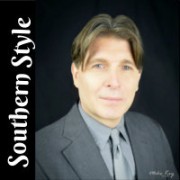A fiddle and the fireplace
Some say it was a coal mine cave-in. Others say it was the fever, but whatever the reason my Grandpa Harve found himself orphaned in a time when, if children were lucky, some relative or caring neighbor took them in.
I don’t know much about his childhood, although I am told his tales of life on the Tennessee River rivaled those of Mark Twain’s “Huckleberry Finn.”
When my dad was a boy, Harve gathered the children around the fireplace and before bed told a story of an orphaned boy named A.J. (his real initials), filled with intrigue of riverboat gamblers and the dangers of riding the rapids on a handmade raft.
 A.J. Harve Franks
A.J. Harve Franks
By this point in his life Grandpa Harve had become what my late cousin, Reece Franks, called demanding. Of course, Reece often found himself out tending to his horse and buggy after he came in from a visit to the general store where he sat and reminisced with his friends.
For some reason, as Harve became a man the waters of time brought him to Catoosa County, Ga. where he courted a young girl named Emily Jane Bandy.
Already a talent at the fiddle, he brought the fiddle along while he courted. Although I think Grandma Emmer often thought he spent more time a fiddlin’ than he did a courtin’.
He eventually won her heart and the couple settled into a life of farming and raising children.
The love of music was something he shared with several of his children, teaching the fiddle to his son Tom. Henry took up the banjo, Ethel learned the piano, Jesse played along on the harmonica and the juice harp, while another one of the boys took up guitar.
As the sun lowered itself behind the hills, the clan would often gather in the parlor after supper and play a few tunes like “Turkey in the Straw,” “Leather Britches,” and “Camptown Races.”
Lester and Griff would roll back the rug and, although she’d probably not admit it the next Sunday at the Baptist church, Emmer and Harve danced a jig or two.
Harve had already passed his love of music along when a farming accident injured his left hand, making him unable to play anymore. That was probably one thing that pained him deep within his soul.
Henry’s death would eventually take the strains of the frailing banjo from the group, and as the family grew and the boys and girls married they took their music with them.
As the grandchildren came buzzing around, I know he would have given anything to pick up his old black fiddle and play them a tune but instead Harve entertained them with his stories of a youth making his way into adulthood in the reconstruction-era South.
I wish some of them had written the stories down but, alas, they are lost with time and even the memories that they ever existed are about gone.
It was from my great-uncle Tom, who made his life in Gordon County’s Sugar Valley, that I first heard play the fiddle close-up. He played some of the same licks that his father played before him.

While Grandpa Harve was not there, I could imagine him sitting at the fireplace, his old black fiddle in hand, playing with all his great-grandchildren gathered around him.
While many gather their earthly musical inspiration from the pop icons of this era who parade across the Grammy Award stage, I still draw my strength from family musical roots that run deep into the Appalachian soil.



